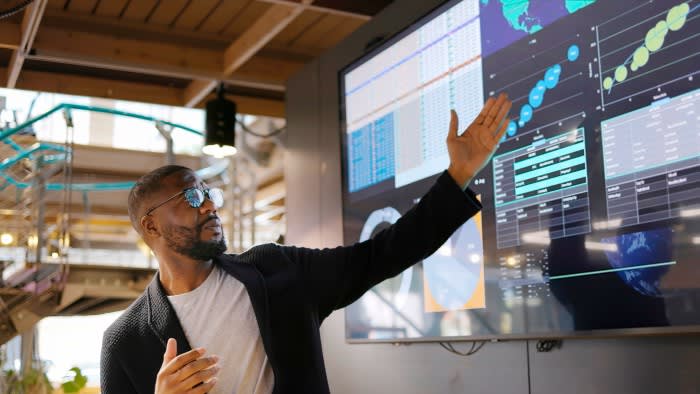Accounting and finance professions have long adapted to technology, from calculators and spreadsheets to cloud computing. However, the emergence of generative artificial intelligence presents both new challenges and opportunities for students looking to advance in the world of finance.
A study last year by investment bank Evercore and Visionary Future, which incubates startups, highlights the disruption that generative AI is causing in the job market. Analyzing 160 million jobs in the United States, the study found that service sectors such as law and finance are highly susceptible to disruption caused by AI, even if a complete replacement of jobs is unlikely.
On the contrary, generative AI should improve productivity, the study concludes, particularly for those in high-value positions paying more than $100,000 per year.
But for current students and graduates earning less than that threshold, the challenge will be adapting to these changes and identifying the skills that will be in demand in the future.
Sign up to the FT Due Diligence newsletter

The top news from the world of corporate finance and private equity, with in-depth analysis of the dealmakers making headlines.
Click here to register now.
Generative AI is rapidly becoming part of finance and accounting, automating specific tasks. Stuart Tait, CTO of tax and legal at KPMG UK, describes it as a “game-changing tool for tax” because it can handle complex tasks beyond routine automation.
“Next-generation AI for tax research and technical analysis will deliver efficiencies comparable to switching from a typewriter to a word processor,” he says. The tools can answer tax questions in minutes, with more than 95% accuracy, Tait says.
While these advances pose challenges for employees, including potentially making certain tasks and skills redundant, they also present opportunities. Simon Stephens, AI lead for audit and assurance at Deloitte UK, says: “One solution is to automate much of the manual data entry, saving time while allowing employees to focus on higher-value and often more interesting work.” He suggests that younger employees could take on more complex and challenging tasks earlier in their careers.
In response to these changes, financial education curricula are evolving to place a greater emphasis on AI. David Shrier, Professor of Practice in AI and Innovation at the University of London Imperial College Business Schoolobserves: “We absolutely need financial education to produce students who are able to adapt to this new world.”
HEC Parisfor example, is already training students to use generative AI for financial data analysis. Soon, it will also be used for decision-making. The aim is to prepare them for the “possibility that generative AI will replace spreadsheets,” notes Evran Örs, academic director of HEC’s Master in International Finance.
In the same way, Cambridge Judge Business School In the UK, the university has set up technical courses and recruited specialists for its Master of Finance, aimed at professionals with work experience. Marwa Hammam, co-director of the programme, notes that all students now master the fundamental concepts of machine learning and its practical applications in trading, asset management, accounting and auditing.
Beyond technical skills like data analysis, soft skills like critical thinking, leadership and networking are increasingly important for finance professionals, experts say.
Angela Gallo, Director of the MSc in International Banking and Finance at Bayes Business School in London, highlights the enduring relevance of interpersonal skills in an increasingly automated industry. “While automation has improved efficiency, it has sometimes sacrificed customer relationships,” she says. “AI could make those relationships more important.”
Gérard Despinoy, Executive Director of the Master in Finance at Paris-Sud University ESSEC Business Schoolsuggests that finance graduates strengthen their programming skills, particularly in VBA, Java, R or Python. Mastery of these languages can streamline financial analysis, automate routine tasks and enable the development of new financial solutions, he says.
Students can gain these skills through courses, industry certifications, and online learning platforms. Andrew Harding, managing director of management accounting at the Association of International Certified Professional Accountants, emphasizes the importance of lifelong professional development to stay competitive in an ever-changing job market: “Accounting and finance professionals need to adapt their mindset to learn, unlearn, and relearn,” he says.
The integration of AI is also creating new roles and career paths. Marc Chapman, a career consultant at Essec, cites jobs such as algorithmic trader and AI financial analyst, in which machine learning could be used to analyze financial data, predict market trends and automate processes. “Banks looking to increase efficiency through digitalization should have interesting career opportunities,” Chapman says.
Looking ahead, experts stress the importance of long-term career planning and adapting to technological change. But finance students shouldn’t neglect the basics. “The core skills of accounting and finance professionals will continue to matter in the future,” Harding says. “Technologies like AI are tools that professionals can use as powerful co-pilots, not replacements.”
Indeed, many experts agree that these technological advances should be seen as opportunities for growth. As Feng Li, professor and chair of information management at Bayes Business School in London, points out: “AI is far from enabling the automation of tasks. The future belongs to those who can use AI to do their jobs more effectively and efficiently.”

